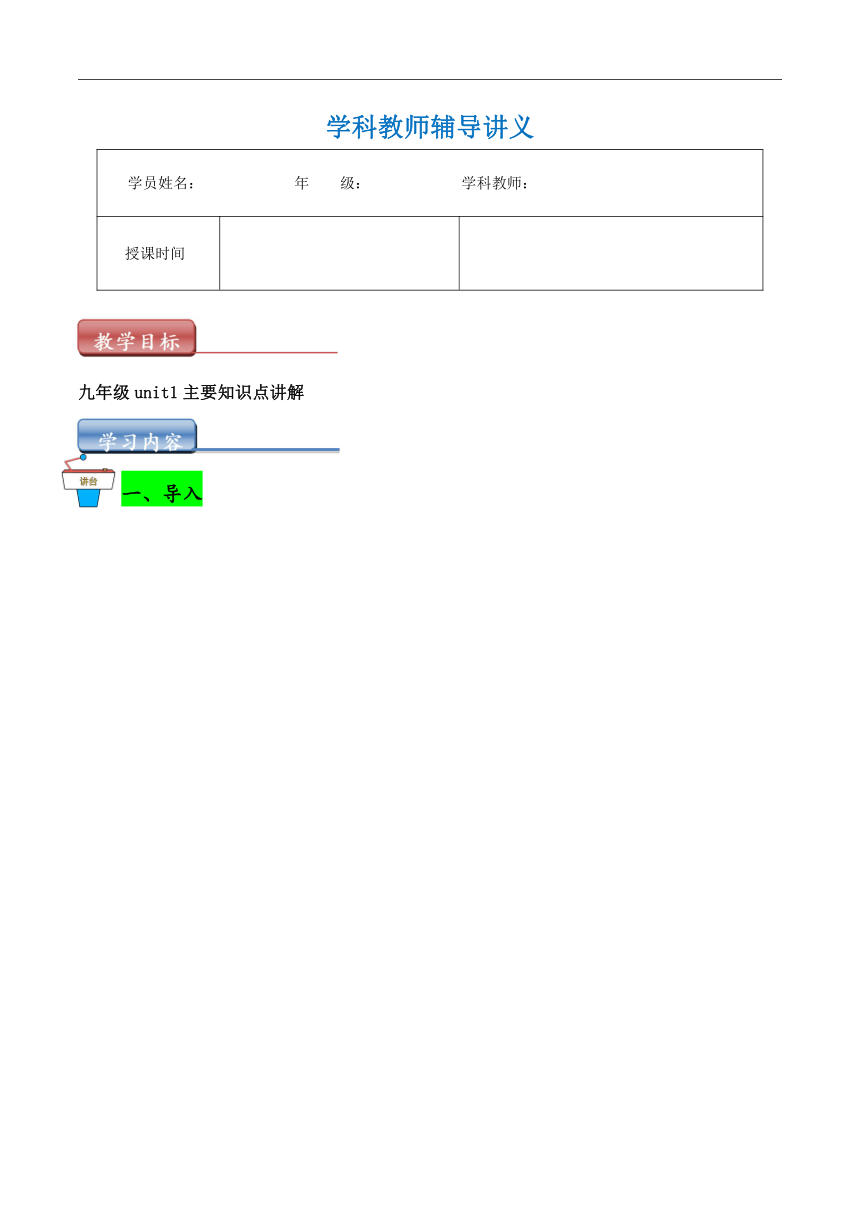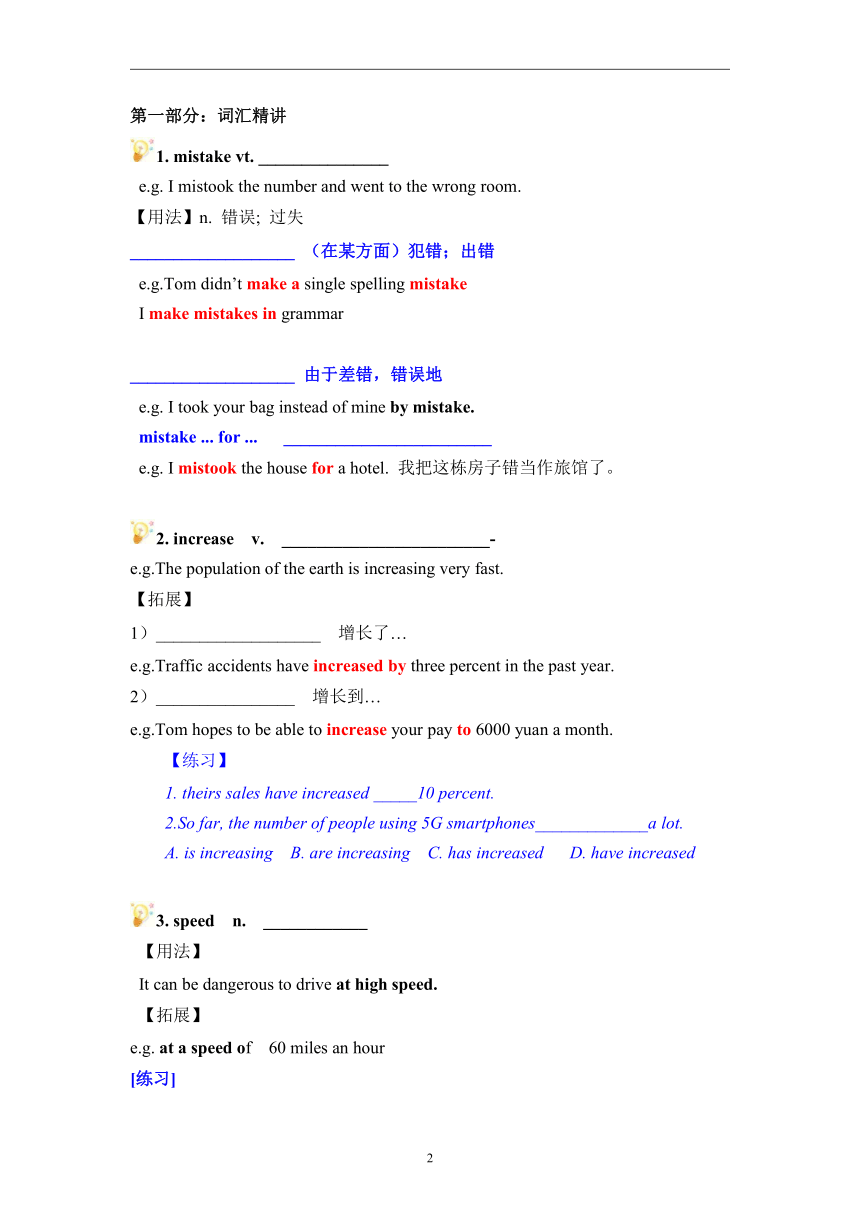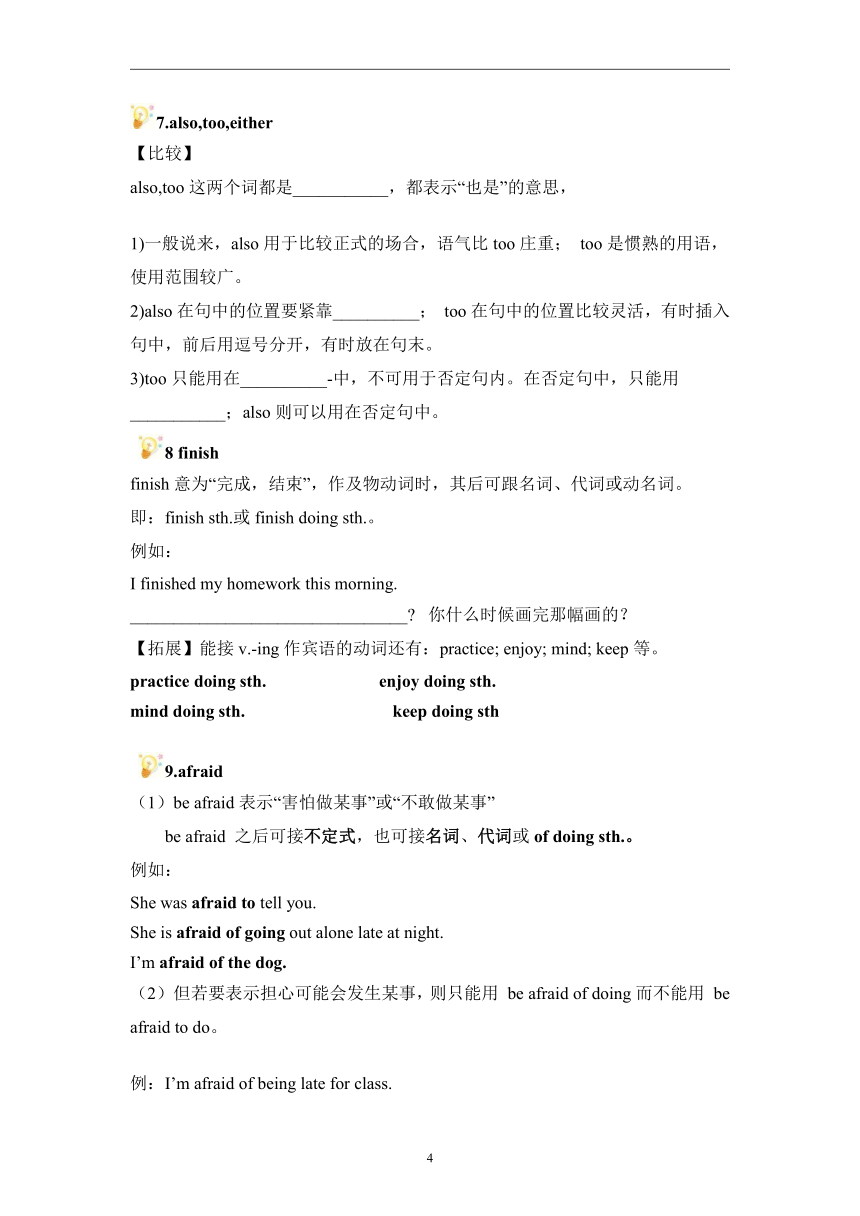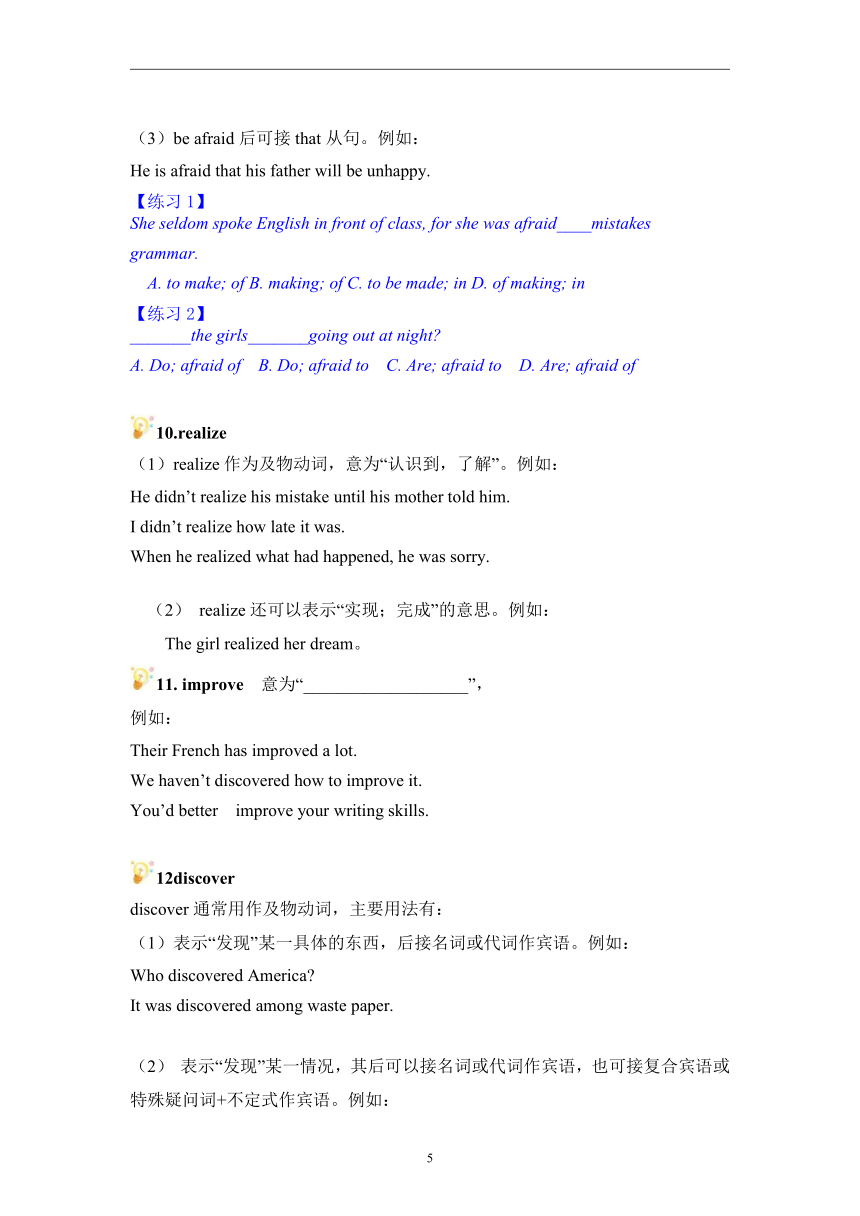Unit 1 How can we become good learners 同步句型和知识点讲解 (含部分答案)
文档属性
| 名称 | Unit 1 How can we become good learners 同步句型和知识点讲解 (含部分答案) |  | |
| 格式 | docx | ||
| 文件大小 | 94.3KB | ||
| 资源类型 | 教案 | ||
| 版本资源 | 人教新目标(Go for it)版 | ||
| 科目 | 英语 | ||
| 更新时间 | 2021-09-05 16:07:46 | ||
图片预览





文档简介
学科教师辅导讲义
学员姓名:
年
级:
学科教师:
授课时间
九年级unit1主要知识点讲解
一、导入
第一部分:词汇精讲
1.
mistake
vt.
_______________
e.g.
I
mistook
the
number
and
went
to
the
wrong
room.
【用法】n.
错误;
过失
___________________
(在某方面)犯错;出错
e.g.Tom
didn’t
make
a
single
spelling
mistake
I
make
mistakes
in
grammar
___________________
由于差错,错误地
e.g.
I
took
your
bag
instead
of
mine
by
mistake.
mistake
...
for
...
________________________
e.g.
I
mistook
the
house
for
a
hotel.
我把这栋房子错当作旅馆了。
2.
increase
v.
________________________-
e.g.The
population
of
the
earth
is
increasing
very
fast.
【拓展】
1)___________________
增长了…
e.g.Traffic
accidents
have
increased
by
three
percent
in
the
past
year.
2)________________
增长到…
e.g.Tom
hopes
to
be
able
to
increase
your
pay
to
6000
yuan
a
month.
【练习】
1.
theirs
sales
have
increased
_____10
percent.
2.So
far,
the
number
of
people
using
5G
smartphones_____________a
lot.
A.
is
increasing
B.
are
increasing
C.
has
increased
D.
have
increased
3.
speed
n.
____________
【用法】
It
can
be
dangerous
to
drive
at
high
speed.
【拓展】
e.g.
at
a
speed
of
60
miles
an
hour
[练习]
Look
at
that
car!
It
is
running
at________
-Yes.
It
runs
at
least
at___________eighty
kilometers
an
hour.
A.
the
high
speed;
the
speed
of
B.
high
speed;
the
speed
of
C.
high
speeds;
a
speed
of
D.
a
high
speed;
speed
of
4.
solution
n.
________________________-
e.g.
It
may
take
a
long
time
to
find
a
solution
to
the
problem.
【拓展】solve
v.解决;
解答
e.g.
I
can
solve
this
problem.
【练习】
Billy
worked
hard
and
found
a
solution_____
the
problem
5.aloud
/
loudly
【用法】
①
aloud
强调发出的声音能被听见,意思为_____________________,常用
read,
call
等动词连用。
e.g.Please
read
the
text
aloud.
②
loud
意为“_________________________,侧重发出的音量大,传得远,一般多用来修饰
___________________等动词。
loud还可用作形容词。
e.g.
Speak
louder,
please,
or
no
one
will
hear
you.
③
loudly
意为“__________-”,其基本意义与
loud
相同,还常与
ring,knock
等动词连用。
loudly
放在动词前后均可,含有“喧闹”或“嘈杂”的意味。
e.g.
Suddenly
the
bell
on
the
wall
rang
loudly.
【练习】What
about_________to
practice
pronunciation
?
A.
read
loudly
B.
reading
loud
C.
read
aloud
D.
reading
aloud
6.
be
like/look
like
【比较】
be
like
用于询问___________
e.g.What
is
Tom
like?
look
like
询问___________
e.g.What
does
your
father
look
like?
7.also,too,either
【比较】
also,too这两个词都是___________,都表示“也是”的意思,
1)一般说来,also用于比较正式的场合,语气比too庄重;
too是惯熟的用语,使用范围较广。
2)also在句中的位置要紧靠__________;
too在句中的位置比较灵活,有时插入句中,前后用逗号分开,有时放在句末。
3)too只能用在__________-中,不可用于否定句内。在否定句中,只能用___________;also则可以用在否定句中。
8
finish
finish意为“完成,结束”,作及物动词时,其后可跟名词、代词或动名词。
即:finish
sth.或finish
doing
sth.。
例如:
I
finished
my
homework
this
morning.?
________________________________??
你什么时候画完那幅画的?
【拓展】能接v.-ing作宾语的动词还有:practice;
enjoy;
mind;
keep等。
practice
doing
sth.
enjoy
doing
sth.
mind
doing
sth.
keep
doing
sth
9.afraid
be
afraid表示“害怕做某事”或“不敢做某事”
be
afraid
之后可接不定式,也可接名词、代词或of
doing
sth.。
例如:
She
was
afraid
to
tell
you.
She
is
afraid
of
going
out
alone
late
at
night.?
I’m
afraid
of
the
dog.
但若要表示担心可能会发生某事,则只能用
be
afraid
of
doing而不能用
be
afraid
to
do。
例:I’m
afraid
of
being
late
for
class.
(3)be
afraid后可接that从句。例如:
He
is
afraid
that
his
father
will
be
unhappy.
【练习1】
She
seldom
spoke
English
in
front
of
class,
for
she
was
afraid____mistakes
grammar.
A.
to
make;
of
B.
making;
of
C.
to
be
made;
in
D.
of
making;
in
【练习2】
_______the
girls_______going
out
at
night?
A.
Do;
afraid
of
B.
Do;
afraid
to
C.
Are;
afraid
to
D.
Are;
afraid
of
10.realize
(1)realize作为及物动词,意为“认识到,了解”。例如:
He
didn’t
realize
his
mistake
until
his
mother
told
him.
I
didn’t
realize
how
late
it
was.?
When
he
realized
what
had
happened,
he
was
sorry.
realize还可以表示“实现;完成”的意思。例如:
The
girl
realized
her
dream。
11.
improve
意为“___________________”,
例如:
Their
French
has
improved
a
lot.
?
We
haven’t
discovered
how
to
improve
it.
You’d
better
improve
your
writing
skills.
12discover
discover通常用作及物动词,主要用法有:
(1)表示“发现”某一具体的东西,后接名词或代词作宾语。例如:
Who
discovered
America?
It
was
discovered
among
waste
paper.?
(2)
表示“发现”某一情况,其后可以接名词或代词作宾语,也可接复合宾语或特殊疑问词+不定式作宾语。例如:
We
soon
discovered
the
truth.?
We
discovered
her
to
be
a
good
cook.?
We
haven’t
discovered
how
to
improve
it.?
【拓展】辨析:discover,find、find
out
及invent
(1)discover
He
discovered
electricity.
(2)find
He
can’t
find
his
watch.
(3)invent
He
invented
the
first
electric
clock.?
(4)find
out
Please
find
out
the
answer
to
the
question.
【练习】
1.最后,我在床底下找到了那本书。
I
_______
_________
_______under
the
bed
in
the
end.
2.我爸爸正到处找他的护照。
My
father_______
______
____________his
passport
everywhere.
3.我们必须查明真相。
We
must______
________
the
truth.
4.你知道哥伦布什么时候发现了美洲吗?
Do
you
know
when
Columbus__________America?
【单项选择】-
-Who________the
computer?
-Sorry,
I've
no
idea.
But
it
has
changed
the
world
greatly.
A.invented
B.
discovered
C.
made
.
D.
played
13.look
up
look
up
意为“(在词典或参考书中)查阅,检查”,其后跟名词作宾语,
名词可放在look和up之间,也可放在look
up
之后;
如果代词作宾语,则只能放在look和up之间。
例如:
Look
up
the
word
in
the
book,
and
you
will
know
its
meaning.。
Please
look
them
up
in
the
dictionary
carefully.
【拓展】look
的相关短语:
look
up(在字典、参考书中)查询所需的信息
look
for寻找
look
over(医生)仔细检查
look
around
环顾四周
look
after照看
look
at
看……
look
down
on
看不起
【练习】.
----Dad,
I
don't
know
this
new
word.
----Well,
you
can__________in
the
dictionary.
A.look
up
it
B.look
it
up
C.look
it
around
D.look
around
it
14.patient
(1)
patient作形容词,意为“有耐心的,
能忍受的”,后接with/of。
He’s
a
very
patient
man.
他是个很有耐心的人。
(2)
patient作名词,意为“病人”。
The
doctor
is
very
patient
with
his
patients.?
那位医师对病人十分耐心。
Would
you
mind
making
some
room
for
the
patient?
请你给这位病人让点儿地方出来行吗?
【练习】
1)Would
you
mind
_______________(close)
the
door?
15
create
(1)
create作动词,意为“创造,创作,创建”。
God
creates
human
beings.
上帝创造了人类。
An
artist
should
create
beautiful
things.?
一个艺术家应该创造美丽的东西。
It
is
people
who
create
history.
?
是人民创造了历史。
【拓展】creative作形容词,意为“有创造性的,有创意的”。
Yoga
releases
the
creative
potential
in
life.??
Pay
close
attention
to
your
own
creative
ideas.
Unit1
句式精讲
1.
I’m
a
little
nervous.
(1)little
和a
little都意为“一点”,
I
have
only
a
little
money.
There
is
little
milk
in
the
fridge.
(
2)a
little还可以修饰形容词和副词,相当于a
bit,意为“有点”。
I’m
a
little
tired.
I
want
to
sleep.
The
weather
is
a
little
cold.
2.
Don’t
read
word
by
word.
(1)
该句是一个祈使句,省略了句子的主语you,以动词原形开头,表示命令、邀请、请求等语气。有时为了表达较委婉或客气的语气,可在句子开头或末尾加please。
例如:Open
the
door,
please!
请打开门。
Come
in,
please.
请进。
祈使句的否定句,一般在句子开头加don’t即可。
例如:
Don’t
forget
to
save
the
document
before
you
turn
off
the
computer.
3.
But
whether
or
not
you
can
do
this
well
depends
on
your
learning
habit.
(1)本句是whether引导的主语从句,意为“是否”,很多时候whether可以和if互换,但是在引导主语从句、表语从句、同位语从句时一般用whether不用if
例如:
Whether
it
is
true
remains
a
question.(主语从句)那是不是真的还是个问题。
The
question
is
whether
it
is
true.(表语从句)问题是是不是真的。
We
have
a
doubt
whether
it
is
true.(同位语从句)
我们怀疑那是不是真的。
if常引导宾语从句,表示“是否”之意。当把一般疑问句的直接引语转化成间接引语时,常用if或whether作引导词。
例如:
I
asked
her,
“Do
you
study
English
here?”
我问她:“你在这里学习英语吗?”
→I
asked
her
if/
whether
she
studied
English
there.
我问她是否在那里学习英语。
【拓展】if和whether的辨析:
例如:
Everything
depends
on
whether
we
have
enough
money.?
(介词后用whether)
Whether
it
is
right
or
wrong,
I
don’t
know.?
(句首表“是否”用whether)
It
doesn’t
matter
whether
he
will
come
or
not.?
(句末有or
not
用whether)
【总结
】if和whether均可表示“是否”,一般情况下二者可以互换。但在下列条件下,只能用whether而不能用if:
(1)if后不能直接接or
not。
(2)whether可作介词的宾语。
(3)whether后可接不定式。
(4)
whether可用于句首。
(5)
whether可引导主语从句、表语从句。
第二部分:重点句型
1.
I
don’t
know
how
to
increase
my
reading
speed.
【用法】“how
to
increase
my
reading
speed”为“_________________”结构,在句中作及物动词的宾语,该句也可以改为一个复合句:__________________________________________________
“疑问词+动词不定式,常用于____________________________________等动词之后作宾语。
e.g.Please
explain
to
me
what
to
do
and
how
to
do
it.
e.g.He
didn’t
know
where
to
meet.
2.
It’s
too
hard
to
understand
the
voices.
【用法】“too
+
形容词/副词
+
to
+
动词原形”结构,意为“_______________”,该句型用于肯定句,但表示________-的意义。
e.g.
He
is
too
young
to
go
to
school.
too…to…前面有_________________________等词时,或出现too
…not
to
do的双重否定时,否定词与不定
式中的否定意义结合起来构成了______________意义。
e.g.It’s
never
too
old
to
learn.
3.
The
teacher
spoke
so
quickly
that
I
didn’t
understand.
【用法】so...that..._________________-
e.g.
The
story
was
so
interesting
that
he
read
it
again.
【拓展】so...that+否定=____________太...而不能...
e.g.
He
is
so
young
that
he
can’t
go
to
school.
He
is
too
young
to
go
to
school.
4.
He
didn’t
go
to
school
because
he
was
ill
yesterday.
【比较】because/because
of
because是连词,其后接________________或回答以why开头的问句;
Tom
didn’t
go
out
because
the
weather
is
cold.
2)because
of是复合介词,其后接名词、______________。
Tom
didn’t
go
out
because
of
the
bad
weather.
汤姆没有出去由于坏天气。
5.It’s
dangerous
for
the
children
to
swim
in
that
river.
【用法】________________________
对某人来说,做某事太...了
此处adj.常见的有:____________有必要的,important重要的,______________有礼貌的,difficult困难的...
e.g.It’s
difficult
for
foreigners
to
learn
Chinese.
6.The
more
you
eat,
the
fatter
you
will
be.
你吃得越多,你就会越胖。
【用法】__________________________,表示“越……越……”。
e.g.The
more
money
you
make,
the
more
you
spend.
【拓展】比较级+and+比较级,表示“__________”
e.g.Houses
are
getting
more
and
more
expensive.
He
is
taller
and
taller.
The
more
you
read,
the
faster
you’ll
be.
“The
+形容词/副词的比较级+主语+谓语,the
+形容词/副词的比较级+主语+谓语”
这个句型是形容词/副词比较级的叠加用法,表示一方的程度随着另一方的程度平行增长,意思是“越......,(就)越......”。例如:
The
more
careful
you
are,
the
fewer
mistakes
you’ll
make.
你越小心,出现的问题就越少。
【拓展】另两种表示比较的句型:
(1)“越来越......”:_______________________例如:
longer
and
longer
???
more
and
more
beautiful
(2)as+
形容词/副词的原级+
as...
例如:
He
is
as
tall
as
my
brother.
他和我的弟弟一样高。
It
is
not
as/
so
warm
as
it
was
yesterday.
今天不如昨天暖和。
【练习】
---
How
hard
you
are
working,
Helen!
-
---We
must!
President
Xi
said
that_______we
are,_______we
will
be.
A.
the
more
hard-working;
the
luckier
B.
the
hard-working;
the
lucky
C.
more
hard-working;
luckier
D.
the
most
hard-working;
the
luckiest
7.You’d
better
practice
speaking
English
everyday.
【用法】______________________.练习做某事
【拓展】_______________________
完成做某事
_______________________介意做某事
_______________________继续做某
_______________________
持续做某事
第三部分:语法点拨
by的用法
1.
“by
+
__________”常常表示手段、方式或方法,可以用来回答how引导的特殊疑问句。
--
How
do
you
learn
English?
--I
learn
English
by
watching
English
movies.
by
的用法:
介词,
表示_________________的意思,
译成“靠,
通过”,
后面可加名词或名词短语。
1)
The
house
was
destroyed
by
fire.
房屋被火烧毁了。
2)
travel
by
air
/land/sea.
航空(陆路,航海)旅行
3)
go
by
train
/boat/
bus
火车(船,公共汽车)去
4)
shake
sb.
by
the
hand
和某人握手
5)
I
study
English
by
watching
English
movies.
我通过看英文电影学英语。
另外,
by作为介词的意义有很多,
例如:
1)在…旁边,靠近
There
is
a
power
station
by
the
river.
2)沿着,经由
come
by
the
highway
3)由于
by
mistake
4)_______
some
articles
written
by
Lu
Xun
5)表示面积
a
room
5m
by
4m
6)逐批
one
by
one
组成其它短语:
1)
by
the
way
:
意为“____________________”,常做插入语。如:
By
the
way,
where’s
Lily?
2)
by
oneself
:
意为“_____________”。如:
I
can’t
leave
her
by
herself.
三、随堂检测
【词汇篇】
【句型语法篇】
Mike
didn't
t
have
supper
yesterday.
He
just
drank
some
juice_________.
A.too
B.
either
C.
instead
D.
instead
of
2.
一.___________reading
aloud
to
practice
English?
一That
sounds
A.
How
about;
great
B.
Why
not;
good
C.
What
about;
well
D.
Why
don't
you;
a
good
idea
3.
Please
tell
us
when
you
will
fnish________the
story
on,_______own.
A.
write;
your
B.
writing:
your
C.
writing.
you
D.
write;
you
4.
-I
am
afraid________English
in
front
of
people.
What
should
I
do?
.
--Don't
be
shy.
Read________,
please.
A.
reading;
aloud
B.
to
read;
aloud
C.
reading;
quickly
D.
to
read:
quickly
5.
In
1998,
Liu
Xiang's__________,in
hurdling
was
noticed
by
Sun
Haiping.
A.
ability
B.
trade
C.
electricity
D.
memory
6._______do
you
go
to
a
movie?
-
Twice
a
week.
A.
How
long
B.
How
soon
C.
How
often
D.
How
far
7.
The
test
was
so
easy
that
I
made._______mistakes.
A.
a
few
B.
a
little
C.
few
D.
Little
8.
-Jane.'
s
spoken
English
is
pretty
good.
--Yeah,
she
works
hard
and
practices__________it
both
in
and
out
of
class.
A.
Spoke
B.
to
speak
C.
speaking
D.
to
speaking
9.
Mom
won't
let
Dick
go
out_____he
promises
to
be
back
by
10:00
tonight.
A
if
B.
when
C.
since
D.
unless
10.
When
I
meet
some
new
words
while
reading.
I
prefer
to
spend
more
time_______in
a
dictionary
now.
A.
look
them
up
.
B.
looking
them
up
C.
look
up
them
D.
looking
up
them
11.
I
don't
have
a
partner__________
A.
practice
English
B.
to
practice
English
C.
practice
English
with
D.
to
practice
English
with
12.-
Hour
school
football
team
last
year.
一You
mean
you
the
last
month's
football
game.
A.
joined;
joined
B.
joined;
took
part
in
C.
took
part
in;
joined
D.
took
part
in;
took
part
in
13.I
can't
understand__________English.
A.
Speak
B.
speaking
C.
Spoken
D.
speaks
.
14.
If
you
are_______in
something,
your
brain
will
be
more
active.
A.
Interest
B.
interested
C.
interesting
D.
interests
15.
He
is
afraid
_____questions.
A.
of
ask
B.
to
asking
C.
of
asking
D.
ask
16.
-You
have
made
such
a
great
progress
on
your
English.
-
-Thanks.
I
believe_______you
work,__________you
will
be.
A.
the
less;
the
better
B.
the
harder;
the
better
C.
the
better;
the
worse
D.
the
harder;
the
less
17.The
traveler_______his
map
to
make
sure
he
was
not
lost.
A.
looked
after
B.
looked
up
C.
looked
for
D.
looked
down
18.
I
don't
know
how________practicing
listening.
A.
to
start
B.
Starting
C.
Starts
D.
started
学员姓名:
年
级:
学科教师:
授课时间
九年级unit1主要知识点讲解
一、导入
第一部分:词汇精讲
1.
mistake
vt.
_______________
e.g.
I
mistook
the
number
and
went
to
the
wrong
room.
【用法】n.
错误;
过失
___________________
(在某方面)犯错;出错
e.g.Tom
didn’t
make
a
single
spelling
mistake
I
make
mistakes
in
grammar
___________________
由于差错,错误地
e.g.
I
took
your
bag
instead
of
mine
by
mistake.
mistake
...
for
...
________________________
e.g.
I
mistook
the
house
for
a
hotel.
我把这栋房子错当作旅馆了。
2.
increase
v.
________________________-
e.g.The
population
of
the
earth
is
increasing
very
fast.
【拓展】
1)___________________
增长了…
e.g.Traffic
accidents
have
increased
by
three
percent
in
the
past
year.
2)________________
增长到…
e.g.Tom
hopes
to
be
able
to
increase
your
pay
to
6000
yuan
a
month.
【练习】
1.
theirs
sales
have
increased
_____10
percent.
2.So
far,
the
number
of
people
using
5G
smartphones_____________a
lot.
A.
is
increasing
B.
are
increasing
C.
has
increased
D.
have
increased
3.
speed
n.
____________
【用法】
It
can
be
dangerous
to
drive
at
high
speed.
【拓展】
e.g.
at
a
speed
of
60
miles
an
hour
[练习]
Look
at
that
car!
It
is
running
at________
-Yes.
It
runs
at
least
at___________eighty
kilometers
an
hour.
A.
the
high
speed;
the
speed
of
B.
high
speed;
the
speed
of
C.
high
speeds;
a
speed
of
D.
a
high
speed;
speed
of
4.
solution
n.
________________________-
e.g.
It
may
take
a
long
time
to
find
a
solution
to
the
problem.
【拓展】solve
v.解决;
解答
e.g.
I
can
solve
this
problem.
【练习】
Billy
worked
hard
and
found
a
solution_____
the
problem
5.aloud
/
loudly
【用法】
①
aloud
强调发出的声音能被听见,意思为_____________________,常用
read,
call
等动词连用。
e.g.Please
read
the
text
aloud.
②
loud
意为“_________________________,侧重发出的音量大,传得远,一般多用来修饰
___________________等动词。
loud还可用作形容词。
e.g.
Speak
louder,
please,
or
no
one
will
hear
you.
③
loudly
意为“__________-”,其基本意义与
loud
相同,还常与
ring,knock
等动词连用。
loudly
放在动词前后均可,含有“喧闹”或“嘈杂”的意味。
e.g.
Suddenly
the
bell
on
the
wall
rang
loudly.
【练习】What
about_________to
practice
pronunciation
?
A.
read
loudly
B.
reading
loud
C.
read
aloud
D.
reading
aloud
6.
be
like/look
like
【比较】
be
like
用于询问___________
e.g.What
is
Tom
like?
look
like
询问___________
e.g.What
does
your
father
look
like?
7.also,too,either
【比较】
also,too这两个词都是___________,都表示“也是”的意思,
1)一般说来,also用于比较正式的场合,语气比too庄重;
too是惯熟的用语,使用范围较广。
2)also在句中的位置要紧靠__________;
too在句中的位置比较灵活,有时插入句中,前后用逗号分开,有时放在句末。
3)too只能用在__________-中,不可用于否定句内。在否定句中,只能用___________;also则可以用在否定句中。
8
finish
finish意为“完成,结束”,作及物动词时,其后可跟名词、代词或动名词。
即:finish
sth.或finish
doing
sth.。
例如:
I
finished
my
homework
this
morning.?
________________________________??
你什么时候画完那幅画的?
【拓展】能接v.-ing作宾语的动词还有:practice;
enjoy;
mind;
keep等。
practice
doing
sth.
enjoy
doing
sth.
mind
doing
sth.
keep
doing
sth
9.afraid
be
afraid表示“害怕做某事”或“不敢做某事”
be
afraid
之后可接不定式,也可接名词、代词或of
doing
sth.。
例如:
She
was
afraid
to
tell
you.
She
is
afraid
of
going
out
alone
late
at
night.?
I’m
afraid
of
the
dog.
但若要表示担心可能会发生某事,则只能用
be
afraid
of
doing而不能用
be
afraid
to
do。
例:I’m
afraid
of
being
late
for
class.
(3)be
afraid后可接that从句。例如:
He
is
afraid
that
his
father
will
be
unhappy.
【练习1】
She
seldom
spoke
English
in
front
of
class,
for
she
was
afraid____mistakes
grammar.
A.
to
make;
of
B.
making;
of
C.
to
be
made;
in
D.
of
making;
in
【练习2】
_______the
girls_______going
out
at
night?
A.
Do;
afraid
of
B.
Do;
afraid
to
C.
Are;
afraid
to
D.
Are;
afraid
of
10.realize
(1)realize作为及物动词,意为“认识到,了解”。例如:
He
didn’t
realize
his
mistake
until
his
mother
told
him.
I
didn’t
realize
how
late
it
was.?
When
he
realized
what
had
happened,
he
was
sorry.
realize还可以表示“实现;完成”的意思。例如:
The
girl
realized
her
dream。
11.
improve
意为“___________________”,
例如:
Their
French
has
improved
a
lot.
?
We
haven’t
discovered
how
to
improve
it.
You’d
better
improve
your
writing
skills.
12discover
discover通常用作及物动词,主要用法有:
(1)表示“发现”某一具体的东西,后接名词或代词作宾语。例如:
Who
discovered
America?
It
was
discovered
among
waste
paper.?
(2)
表示“发现”某一情况,其后可以接名词或代词作宾语,也可接复合宾语或特殊疑问词+不定式作宾语。例如:
We
soon
discovered
the
truth.?
We
discovered
her
to
be
a
good
cook.?
We
haven’t
discovered
how
to
improve
it.?
【拓展】辨析:discover,find、find
out
及invent
(1)discover
He
discovered
electricity.
(2)find
He
can’t
find
his
watch.
(3)invent
He
invented
the
first
electric
clock.?
(4)find
out
Please
find
out
the
answer
to
the
question.
【练习】
1.最后,我在床底下找到了那本书。
I
_______
_________
_______under
the
bed
in
the
end.
2.我爸爸正到处找他的护照。
My
father_______
______
____________his
passport
everywhere.
3.我们必须查明真相。
We
must______
________
the
truth.
4.你知道哥伦布什么时候发现了美洲吗?
Do
you
know
when
Columbus__________America?
【单项选择】-
-Who________the
computer?
-Sorry,
I've
no
idea.
But
it
has
changed
the
world
greatly.
A.invented
B.
discovered
C.
made
.
D.
played
13.look
up
look
up
意为“(在词典或参考书中)查阅,检查”,其后跟名词作宾语,
名词可放在look和up之间,也可放在look
up
之后;
如果代词作宾语,则只能放在look和up之间。
例如:
Look
up
the
word
in
the
book,
and
you
will
know
its
meaning.。
Please
look
them
up
in
the
dictionary
carefully.
【拓展】look
的相关短语:
look
up(在字典、参考书中)查询所需的信息
look
for寻找
look
over(医生)仔细检查
look
around
环顾四周
look
after照看
look
at
看……
look
down
on
看不起
【练习】.
----Dad,
I
don't
know
this
new
word.
----Well,
you
can__________in
the
dictionary.
A.look
up
it
B.look
it
up
C.look
it
around
D.look
around
it
14.patient
(1)
patient作形容词,意为“有耐心的,
能忍受的”,后接with/of。
He’s
a
very
patient
man.
他是个很有耐心的人。
(2)
patient作名词,意为“病人”。
The
doctor
is
very
patient
with
his
patients.?
那位医师对病人十分耐心。
Would
you
mind
making
some
room
for
the
patient?
请你给这位病人让点儿地方出来行吗?
【练习】
1)Would
you
mind
_______________(close)
the
door?
15
create
(1)
create作动词,意为“创造,创作,创建”。
God
creates
human
beings.
上帝创造了人类。
An
artist
should
create
beautiful
things.?
一个艺术家应该创造美丽的东西。
It
is
people
who
create
history.
?
是人民创造了历史。
【拓展】creative作形容词,意为“有创造性的,有创意的”。
Yoga
releases
the
creative
potential
in
life.??
Pay
close
attention
to
your
own
creative
ideas.
Unit1
句式精讲
1.
I’m
a
little
nervous.
(1)little
和a
little都意为“一点”,
I
have
only
a
little
money.
There
is
little
milk
in
the
fridge.
(
2)a
little还可以修饰形容词和副词,相当于a
bit,意为“有点”。
I’m
a
little
tired.
I
want
to
sleep.
The
weather
is
a
little
cold.
2.
Don’t
read
word
by
word.
(1)
该句是一个祈使句,省略了句子的主语you,以动词原形开头,表示命令、邀请、请求等语气。有时为了表达较委婉或客气的语气,可在句子开头或末尾加please。
例如:Open
the
door,
please!
请打开门。
Come
in,
please.
请进。
祈使句的否定句,一般在句子开头加don’t即可。
例如:
Don’t
forget
to
save
the
document
before
you
turn
off
the
computer.
3.
But
whether
or
not
you
can
do
this
well
depends
on
your
learning
habit.
(1)本句是whether引导的主语从句,意为“是否”,很多时候whether可以和if互换,但是在引导主语从句、表语从句、同位语从句时一般用whether不用if
例如:
Whether
it
is
true
remains
a
question.(主语从句)那是不是真的还是个问题。
The
question
is
whether
it
is
true.(表语从句)问题是是不是真的。
We
have
a
doubt
whether
it
is
true.(同位语从句)
我们怀疑那是不是真的。
if常引导宾语从句,表示“是否”之意。当把一般疑问句的直接引语转化成间接引语时,常用if或whether作引导词。
例如:
I
asked
her,
“Do
you
study
English
here?”
我问她:“你在这里学习英语吗?”
→I
asked
her
if/
whether
she
studied
English
there.
我问她是否在那里学习英语。
【拓展】if和whether的辨析:
例如:
Everything
depends
on
whether
we
have
enough
money.?
(介词后用whether)
Whether
it
is
right
or
wrong,
I
don’t
know.?
(句首表“是否”用whether)
It
doesn’t
matter
whether
he
will
come
or
not.?
(句末有or
not
用whether)
【总结
】if和whether均可表示“是否”,一般情况下二者可以互换。但在下列条件下,只能用whether而不能用if:
(1)if后不能直接接or
not。
(2)whether可作介词的宾语。
(3)whether后可接不定式。
(4)
whether可用于句首。
(5)
whether可引导主语从句、表语从句。
第二部分:重点句型
1.
I
don’t
know
how
to
increase
my
reading
speed.
【用法】“how
to
increase
my
reading
speed”为“_________________”结构,在句中作及物动词的宾语,该句也可以改为一个复合句:__________________________________________________
“疑问词+动词不定式,常用于____________________________________等动词之后作宾语。
e.g.Please
explain
to
me
what
to
do
and
how
to
do
it.
e.g.He
didn’t
know
where
to
meet.
2.
It’s
too
hard
to
understand
the
voices.
【用法】“too
+
形容词/副词
+
to
+
动词原形”结构,意为“_______________”,该句型用于肯定句,但表示________-的意义。
e.g.
He
is
too
young
to
go
to
school.
too…to…前面有_________________________等词时,或出现too
…not
to
do的双重否定时,否定词与不定
式中的否定意义结合起来构成了______________意义。
e.g.It’s
never
too
old
to
learn.
3.
The
teacher
spoke
so
quickly
that
I
didn’t
understand.
【用法】so...that..._________________-
e.g.
The
story
was
so
interesting
that
he
read
it
again.
【拓展】so...that+否定=____________太...而不能...
e.g.
He
is
so
young
that
he
can’t
go
to
school.
He
is
too
young
to
go
to
school.
4.
He
didn’t
go
to
school
because
he
was
ill
yesterday.
【比较】because/because
of
because是连词,其后接________________或回答以why开头的问句;
Tom
didn’t
go
out
because
the
weather
is
cold.
2)because
of是复合介词,其后接名词、______________。
Tom
didn’t
go
out
because
of
the
bad
weather.
汤姆没有出去由于坏天气。
5.It’s
dangerous
for
the
children
to
swim
in
that
river.
【用法】________________________
对某人来说,做某事太...了
此处adj.常见的有:____________有必要的,important重要的,______________有礼貌的,difficult困难的...
e.g.It’s
difficult
for
foreigners
to
learn
Chinese.
6.The
more
you
eat,
the
fatter
you
will
be.
你吃得越多,你就会越胖。
【用法】__________________________,表示“越……越……”。
e.g.The
more
money
you
make,
the
more
you
spend.
【拓展】比较级+and+比较级,表示“__________”
e.g.Houses
are
getting
more
and
more
expensive.
He
is
taller
and
taller.
The
more
you
read,
the
faster
you’ll
be.
“The
+形容词/副词的比较级+主语+谓语,the
+形容词/副词的比较级+主语+谓语”
这个句型是形容词/副词比较级的叠加用法,表示一方的程度随着另一方的程度平行增长,意思是“越......,(就)越......”。例如:
The
more
careful
you
are,
the
fewer
mistakes
you’ll
make.
你越小心,出现的问题就越少。
【拓展】另两种表示比较的句型:
(1)“越来越......”:_______________________例如:
longer
and
longer
???
more
and
more
beautiful
(2)as+
形容词/副词的原级+
as...
例如:
He
is
as
tall
as
my
brother.
他和我的弟弟一样高。
It
is
not
as/
so
warm
as
it
was
yesterday.
今天不如昨天暖和。
【练习】
---
How
hard
you
are
working,
Helen!
-
---We
must!
President
Xi
said
that_______we
are,_______we
will
be.
A.
the
more
hard-working;
the
luckier
B.
the
hard-working;
the
lucky
C.
more
hard-working;
luckier
D.
the
most
hard-working;
the
luckiest
7.You’d
better
practice
speaking
English
everyday.
【用法】______________________.练习做某事
【拓展】_______________________
完成做某事
_______________________介意做某事
_______________________继续做某
_______________________
持续做某事
第三部分:语法点拨
by的用法
1.
“by
+
__________”常常表示手段、方式或方法,可以用来回答how引导的特殊疑问句。
--
How
do
you
learn
English?
--I
learn
English
by
watching
English
movies.
by
的用法:
介词,
表示_________________的意思,
译成“靠,
通过”,
后面可加名词或名词短语。
1)
The
house
was
destroyed
by
fire.
房屋被火烧毁了。
2)
travel
by
air
/land/sea.
航空(陆路,航海)旅行
3)
go
by
train
/boat/
bus
火车(船,公共汽车)去
4)
shake
sb.
by
the
hand
和某人握手
5)
I
study
English
by
watching
English
movies.
我通过看英文电影学英语。
另外,
by作为介词的意义有很多,
例如:
1)在…旁边,靠近
There
is
a
power
station
by
the
river.
2)沿着,经由
come
by
the
highway
3)由于
by
mistake
4)_______
some
articles
written
by
Lu
Xun
5)表示面积
a
room
5m
by
4m
6)逐批
one
by
one
组成其它短语:
1)
by
the
way
:
意为“____________________”,常做插入语。如:
By
the
way,
where’s
Lily?
2)
by
oneself
:
意为“_____________”。如:
I
can’t
leave
her
by
herself.
三、随堂检测
【词汇篇】
【句型语法篇】
Mike
didn't
t
have
supper
yesterday.
He
just
drank
some
juice_________.
A.too
B.
either
C.
instead
D.
instead
of
2.
一.___________reading
aloud
to
practice
English?
一That
sounds
A.
How
about;
great
B.
Why
not;
good
C.
What
about;
well
D.
Why
don't
you;
a
good
idea
3.
Please
tell
us
when
you
will
fnish________the
story
on,_______own.
A.
write;
your
B.
writing:
your
C.
writing.
you
D.
write;
you
4.
-I
am
afraid________English
in
front
of
people.
What
should
I
do?
.
--Don't
be
shy.
Read________,
please.
A.
reading;
aloud
B.
to
read;
aloud
C.
reading;
quickly
D.
to
read:
quickly
5.
In
1998,
Liu
Xiang's__________,in
hurdling
was
noticed
by
Sun
Haiping.
A.
ability
B.
trade
C.
electricity
D.
memory
6._______do
you
go
to
a
movie?
-
Twice
a
week.
A.
How
long
B.
How
soon
C.
How
often
D.
How
far
7.
The
test
was
so
easy
that
I
made._______mistakes.
A.
a
few
B.
a
little
C.
few
D.
Little
8.
-Jane.'
s
spoken
English
is
pretty
good.
--Yeah,
she
works
hard
and
practices__________it
both
in
and
out
of
class.
A.
Spoke
B.
to
speak
C.
speaking
D.
to
speaking
9.
Mom
won't
let
Dick
go
out_____he
promises
to
be
back
by
10:00
tonight.
A
if
B.
when
C.
since
D.
unless
10.
When
I
meet
some
new
words
while
reading.
I
prefer
to
spend
more
time_______in
a
dictionary
now.
A.
look
them
up
.
B.
looking
them
up
C.
look
up
them
D.
looking
up
them
11.
I
don't
have
a
partner__________
A.
practice
English
B.
to
practice
English
C.
practice
English
with
D.
to
practice
English
with
12.-
Hour
school
football
team
last
year.
一You
mean
you
the
last
month's
football
game.
A.
joined;
joined
B.
joined;
took
part
in
C.
took
part
in;
joined
D.
took
part
in;
took
part
in
13.I
can't
understand__________English.
A.
Speak
B.
speaking
C.
Spoken
D.
speaks
.
14.
If
you
are_______in
something,
your
brain
will
be
more
active.
A.
Interest
B.
interested
C.
interesting
D.
interests
15.
He
is
afraid
_____questions.
A.
of
ask
B.
to
asking
C.
of
asking
D.
ask
16.
-You
have
made
such
a
great
progress
on
your
English.
-
-Thanks.
I
believe_______you
work,__________you
will
be.
A.
the
less;
the
better
B.
the
harder;
the
better
C.
the
better;
the
worse
D.
the
harder;
the
less
17.The
traveler_______his
map
to
make
sure
he
was
not
lost.
A.
looked
after
B.
looked
up
C.
looked
for
D.
looked
down
18.
I
don't
know
how________practicing
listening.
A.
to
start
B.
Starting
C.
Starts
D.
started
同课章节目录
- Unit 1 How can we become good learners.
- Section A
- Section B
- Unit 2 I think that mooncakes are delicious!
- Section A
- Section B
- Unit 3 Could you please tell me where the restroom
- Section A
- Section B
- Unit 4 I used to be afraid of the dark.
- Section A
- Section B
- Unit 5 What are the shirts made of?
- Section A
- Section B
- Review of Units 1-5
- Unit 6 When was it invented?
- Section A
- Section B
- Unit 7 Teenagers should be allowed to choose their
- Section A
- Section B
- Unit 8 It must belong to Carla.
- Section A
- Section B
- Unit 9 I like music that I can dance to.
- Section A
- Section B
- Unit 10 You're supposed to shake hands.
- Section A
- Section B
- Review of Units 6-10
- Unit 11 Sad movies make me cry.
- Section A
- Section B
- Unit 12 Life is full of the unexpected
- Section A
- Section B
- Unit 13 We're trying to save the earth!
- Section A
- Section B
- Unit 14 I remember meeting all of you in Grade 7.
- Section A
- Section B
- Review of Units 11-14
